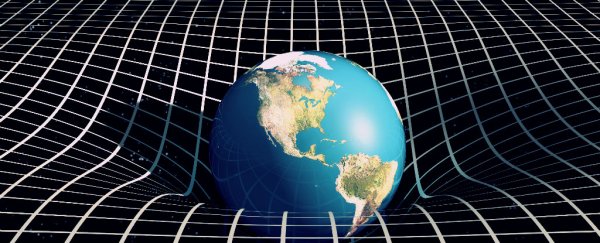For years, physicists have attempted to explain dark energy - a mysterious influence that pushes space apart faster than gravity can pull the things in it together. But physics isn't always about figuring out what things are. A lot of it is figuring out what things cause.
And in a recent paper, a group of physicists asked this very question about dark energy, and found that in some cases, it might cause time to go forward.
When you throw a ball into the air, it starts with some initial speed-up, but then it slows as Earth's gravity pulls it down. If you throw it fast enough (about 11 km per second, for those who want to try), it'll never slow down enough to turn around and start falling back towards you, but it'll still move more slowly as it moves away from you, because of Earth's gravity.
Physicists and astronomers in the 1990s expected something similar to have occured after the big bang - an event that threw matter out in all directions. The collective gravity from all that matter should have slowed it all down, just like the Earth slows down the ball. But that's not what they found.
Instead, everything seems to have sped up. There's something pervading the Universe that physically spreads space apart faster than gravity can pull things together. The effect is small - it's only noticeable when you look at far-away galaxies - but it's there. It's become known as dark energy - "dark", because no one knows what it is.
Science is nothing if not the process of humans looking for things they can't explain, so this isn't the first time the Universe has stumped us. For centuries, one of those stumpers has been time itself: Why does time have an arrow pointing from the past to the present to the future?
It might seem like a silly question - I mean, if time didn't go forward, then effects would precede causes, and that seems like it should be impossible - but it's less of one than you might think.
The Universe, as far as we can tell, only operates according to laws of physics. And just about all of the laws of physics that we know are completely time-reversible, meaning that the things they cause look exactly the same whether time runs forward or backward.
One example is the path of a planet going around a star, which is governed by gravity. Whether time runs forward or backward, planetary orbits follow the exact same paths. The only difference is the direction of the orbit.
But one important piece of physics isn't time-reversible, and that's the second law of thermodynamics. It states that as time moves forward, the amount of disorder in the Universe will always increase. Just like dark energy, it's something we've noticed about the Universe, and it's something that we still don't totally understand - though admittedly we have a better idea of it than we do of dark energy.
Physicists have, for this reason, reluctantly settled on the second law as the source of time's arrow: disorder always has to increase after something happens, which requires that time can only move in one direction.
So physicists A. E. Allahverdyan from the Yerevan Physics Institute and V. G. Gurzadyan from Yerevan State University, both in Armenia, decided to see if - at least in a limited situation - dark energy and the second law might be related. To test it, they looked at the simple case of something like a planet orbiting a star with a changing mass.
They found that if dark energy either doesn't exist or if it pulls space together, the planet just dully orbits the star without anything interesting happening. There's no way to tell an orbit going forward in time from one going backward in time.
But if dark energy pushes space apart, like it does in our Universe, the planet eventually gets thrown away from the star on a path of no return. This gives us a distinction between the past and the future: run time one way, and the planet is flung off, run it the other way, and the planet comes in and gets captured by the star.
Dark energy naturally leads to an arrow of time.
The authors stress that this is a really limited situation, and they're certainly not claiming dark energy is the reason time only ever moves forward. But they've shown a possible link between thermodynamics and dark energy that could help us to understand either - or maybe both - better than we ever have.
The research has been published in Physical Review E.
